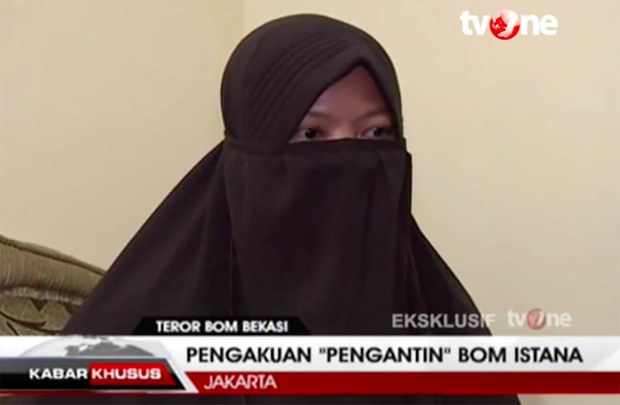Indonesian IS Leader Sought Female Suicide Bombers: Think-Tank
2017.02.01
Jakarta
 This screen shot from a YouTube video shows Dian Yulia Novi, a suspected Indonesian suicide bomber, during her interview with a local TV station in Jakarta, Dec. 13, 2016.
This screen shot from a YouTube video shows Dian Yulia Novi, a suspected Indonesian suicide bomber, during her interview with a local TV station in Jakarta, Dec. 13, 2016.
An Indonesian leader of the Islamic State (IS) sought to recruit women as suicide bombers, according to a new report by the Institute for Policy Analysis of Conflict (IPAC), a Jakarta think-tank.
The report focuses on efforts by two Indonesian women to blow themselves up in December 2016, and details efforts by Bahrun Naim – alleged to be a leading Indonesian IS recruiter and propagandist based in Syria – to recruit a woman named Dian Yulia Novi to fulfill his new strategy of using females suicide bombers.
The report includes a blog response from Bahrun when asked if it was permissible for women to be involved in operations by Islamic militants.
“In the Islamic State, there are still many men to fight. It becomes an obligation for women when men no longer want to fight, as in Indonesia,” Bahrun wrote, according to the 27-page report, “Mothers to Bombers: The Evolution of Indonesian Women Extremists,” which IPAC published on Tuesday.
According IPAC analyst Nava Nuraniyah, a combination of IS and communications technology has “dramatically changed how women extremists see themselves.”
“ISIS has given them a more universal mission, while various forms of social media have enabled them to share information and reinforce their own aspirations,” Nava said in a statement accompanying the report’s release, referring to IS by another acronym.
“While leaders of most violent jihadi organizations continue to see the ideal role of women as ‘lionesses’ staying home and producing ‘cubs’,” Nava added, “it is clear that some Indonesian women are eager to emulate the lethal practices of their sisters in other parts of the world.”
Arif Darmawan, senior official at the National Counterterrorism Agency (BNPT), said that it was unusual for Indonesian women to be recruited for suicide missions.
“Radical groups using women occur a lot in India, Pakistan and other countries, but in Indonesia there has never been a terror act using a woman. It has always been prevented,” Arif told BenarNews.
Recruitment
Bahrun Naim and other IS leaders in Syria have turned to recruiting women because “they are less likely to attract suspicion,” the report suggested.
It delved into how Bahrun ordered Indonesian citizen Nur Solihin to find a female-bomber candidate.
After his first choice joined a different cell, Nur Solihin took on Dian as his second wife because a fatwa issued by IS required women to have permission of their fathers or husbands “to carry out any activities outside their home – even for worshipping, including by becoming a martyr,” the report said.
One of Dian’s motives was to save her father, who was seriously ill and had sought help from a witch doctor.
“She thought that the only way to save him from divine punishment was to sacrifice herself as a martyr, because she had read that a martyr could save herself and her extended family from the wrath of God,” the report said.
Dian had planned to detonate a rice cooker packed with explosives during a changing-of-the-guard ceremony outside the presidential palace on Dec. 11, police said. The couple was arrested when their plot failed and both gave TV interviews discussing their marriage and efforts to carry out the attack.
The couple’s testimony led to the arrests of other terror suspects, including “a woman named Ika Puspitasari, alias Tasnima Salsabila, who was allegedly preparing to carry out a separate operation in Bali,” IPAC said.
Ika, who had been working as a maid in Hong Kong before returning to Indonesia in November 2016, contributed 8 million rupiah (U.S. $596) to fund a planned attack, IPAC reported.
Nusron Wahid, who heads the National Agency for the Placement and Protection of Indonesian Workers, said his agency communicates with BNPT and others to counteract the recruitment of female migrants by radical groups, through disseminating information in destination countries.
“It is a priority and our concern to protect migrant workers, as well as to prevent them to be recruited by IS,” he told BenarNews.







